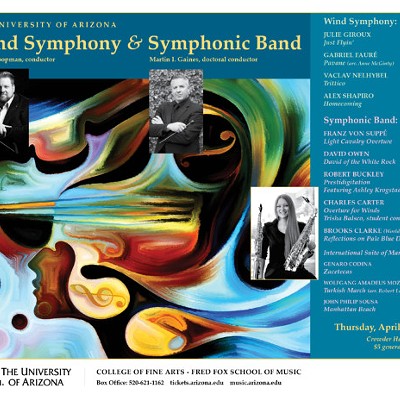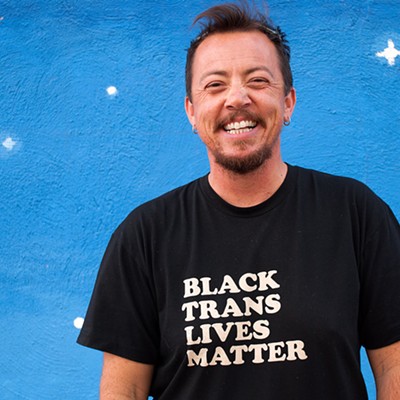When the California native obtained her master's degree in English at UCLA in 1976, she hoped to become a college teacher. A recession sucked all those jobs off the market, though, so Browne went into public relations. There she thrived, founding and directing Browne-Zukow associates, a San Francisco-based communications company specializing in the arts, with billings of over $5 million.
Three years ago, feeling she'd learned as much as she could in her own PR company, she dreamed of establishing a creative arts retreat in Northern California. But facing exorbitant real estate prices and a tanking economy, she made little headway.
On July 1 she became the new director of the University of Arizona Poetry Center. One of her biggest responsibilities will be to oversee the second half of a campaign to raise $4.5 million for a new facility, with a possible groundbreaking in 2004. Anybody checked the health of Arizona's economy lately? Yep, Gail Browne's come to town.
After heavy Legislature-mandated budget cuts, every unit of the UA is desperate for dollars, and Browne is well aware that the majority of potential donors here would prefer to contribute money to science and business programs.
"The arts in general are a more difficult sell than more scientific disciplines," she notes. "But, especially in Tucson, there is certainly an interest in the arts and in libraries, so that bodes well for us."
The public knows the Poetry Center as the sponsor of reading series featuring writers of national and international repute, as well as new voices from the UA's own creative writing program. But the Poetry Center is also a repository, open to the public, of non-circulating books, journals, recordings and other materials devoted to poetry. Separate from the main UA library system, about half the center's collection is crammed into a quaint but cramped old house on Cherry Boulevard, with the remainder in storage. That house and one next door also provide office space for the staff, a small seminar room and a charming backyard reading and meeting area. A third house is reserved as a bungalow for visiting poets and scholars.
Founded in 1960 by writer and Walgreen's heiress Ruth Stephan and dedicated the following year by Robert Frost, the center enjoys a secure $1.2 million endowment for library acquisitions, so adding more piles of poems isn't the problem; space is.
And so is the direction of the grant-funded reading series, according to observers who speculated that poet Jim Paul was canned early last year after only 14 months as Poetry Center director because he dared to add hip-hop poets to the mix (see "Poetic Injustice," March 15, 2001). Although nobody would talk details at the time, it seems far more likely that Paul just wasn't getting the $4.5 million fund-raising campaign launched aggressively enough.
Browne obviously has a fine background in public relations and moving bundles of money around the arts world; she is not, however, a poet, as are Jim Paul and Alison Deming, who, aside from Paul's tenure, has directed the center since 1990. But Lois Shelton isn't a poet, either; she is a singer (married to a poet, Richard Shelton) who governed the center admirably all through the 1970s and '80s.
Browne doesn't see her lack of poetic credentials as a liability. For one thing, she may not produce poetry herself, but she consumes it avidly. "I felt a need to return to a desert landscape as I approached my next set of life goals," says Browne, who grew up in Indio, Calif., "and when I was deciding where to move, the Poetry Center was a big draw. It's the first place I came when I moved here a year ago. I didn't know that this job would be opening; I just felt very at home here."
Not only that, but Browne lists as her former teachers Eloise Klein Healy, chair of the MFA program in creative writing at Antioch University in Los Angeles, and Bay Area poet Ellery Akers. Literature, remember, is her educational background; this is not an MBA drone, and she was recommended unanimously to Chuck Tatum, dean of the UA College of Humanities, by a search committee that included members of the Poetry Center's advisory board and the UA's creative writing faculty.
"We're extraordinarily pleased to have her," says Tatum. "Her remarkable blend of experience and talents will serve us very well. We were very impressed by her proven record as an arts administrator in the Bay Area, and her familiarity with the literary arts in general and the American poetry scene in particular."
Browne anticipates devoting the bulk of her time to administrative work, leaving much of the reading series' direction to Frances Sjoberg, the center's assistant director, with input from the advisory board.
"Frances is a very strong writer and critic," says Browne. "She's very well versed in contemporary poetry, and she'll keep the reading series fresh. We both want to make it as diverse as possible--keep bringing in the distinguished poets, but reach out to new audiences, too."
Readings already get a respectable audience: about 300 people at the regular series in the UA Modern Languages auditorium, and about 500 when Carolyn Forché appeared at St. Philip's in the Hills church last spring. That's not bad for a supposedly marginal art form.
"I'm amazed at how vibrant the poetry scene is in Tucson," Browne says. "It feels in some ways more muscular than in San Francisco, maybe because here it's so concentrated."
Yet Browne won't be content to preach to the choir; she wants the center to reach out to people who aren't already true believers in poetry. "The Poetry Center has always been considered kind of a literary center for Tucson," she says, "and I think that quality of being a community center and information resource for everyone will be expanded in the new space.
"I want to make sure that people understand the value the Poetry Center has not only for Tucson, but for the literary community worldwide. Ruth Stephan's vision was simple: to maintain and cherish the spirit of poetry. My job is to communicate that vision and her story to a larger audience.
"When you step into an institution that had a founder and a vision, you have a responsibility to respect that vision, to check your own goals to make sure they're in alignment with the original vision.
"This is something I really believe in personally. As a culture, we're only going to thrive if we prioritize the creative spirit, and that spirit continues to be under threat. The Poetry Center is about nurturing and giving voice to creativity."











